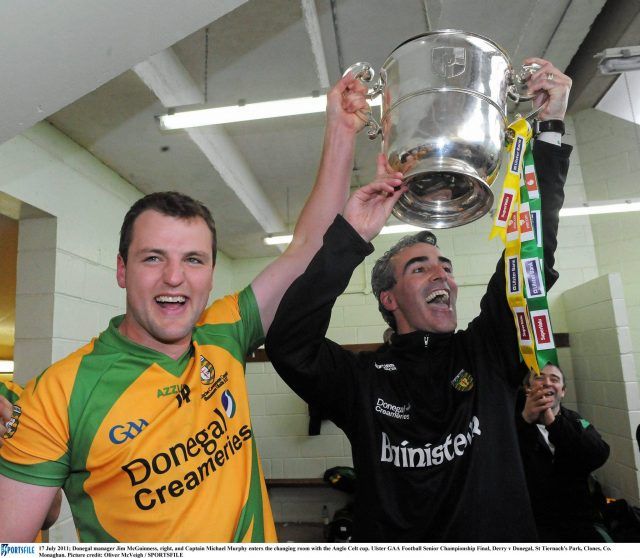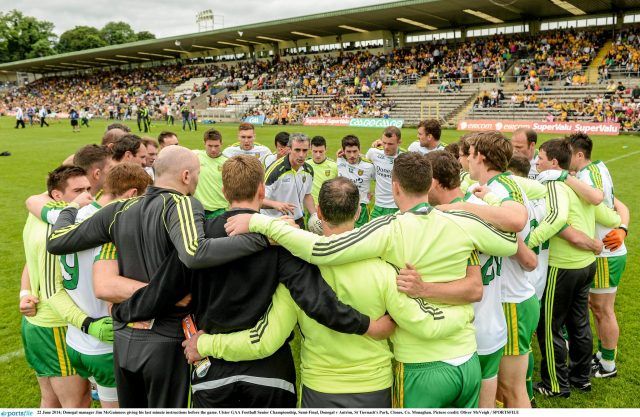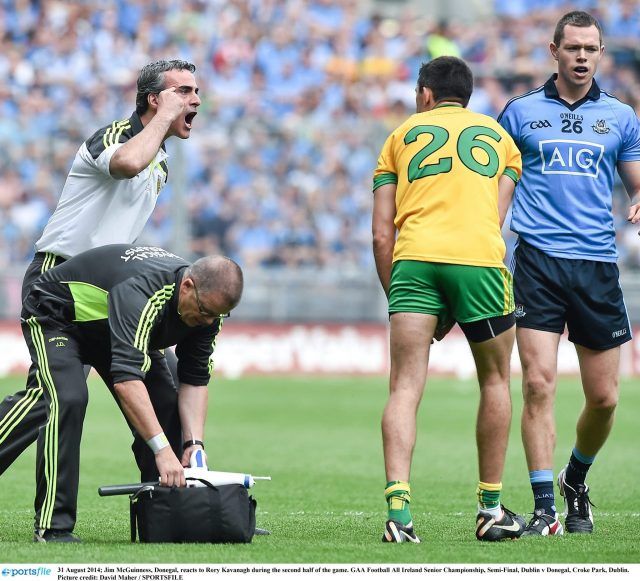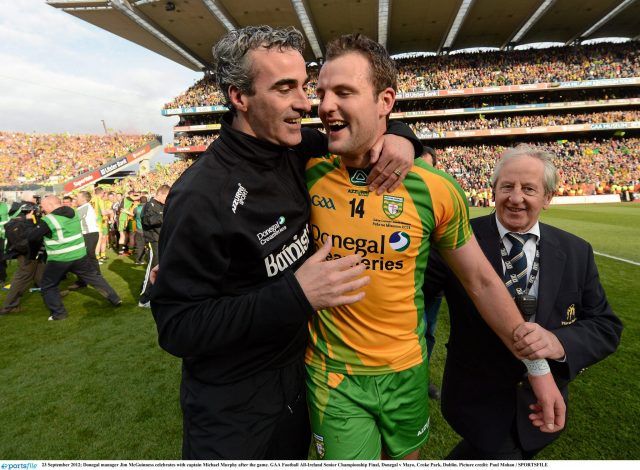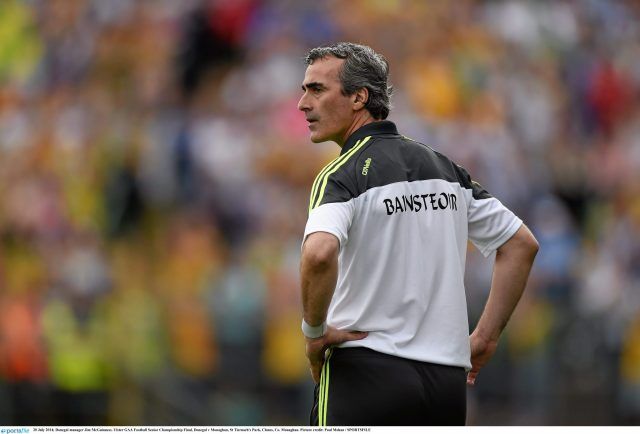Football was never the same again after his last stint.
Jim McGuinness is touted to become Donegal’s new manager once again, and the effect that this could have on Donegal and Gaelic football as a whole, is seismic.
Much like in 2011 when McGuinness first took the reins, the Donegal senior football team are at a low ebb, and the noise around the camp is largely negative.
Back then they were embarrassed by Armagh in the Ulster championship, and couldn’t seem further away from competing for an Ulster title, never mind the All-Ireland.
Now, following the disastrous manner in which the players forced Paddy Carr to resign, the off-field drama surrounding the academy teams and Karl Lacey’s walk-out from his role there, Donegal is not in a great place right now.
What Jim McGuinness’ return could mean for Donegal and Gaelic football
Their leader and talisman Michael Murphy retired, Paddy McBrearty has been tortured with injuries and Ryan McHugh walked away because of work commitments, so the core of the team has been largely absent.
Yet, the mere appointment of McGuinness would inject a surge of hope, enthusiasm and excitement back into the county, and peak the curiosity of everyone in the GAA.
Last time around, the Naomh Conaill clubman catapulted Donegal from obscurity to the All-Ireland title, and changed the game as we knew it forever.
McGuinness is an extremist, and that’s not an insult. He genuinely believes in doing everything to 100% of your maximum capacity, regardless of the personal cost or consequences.
When Donegal played Kildare in the All-Ireland quarter-final in 2011, people could barely believe their eyes as all 15 of the Ulster team’s players were behind the ball, defending in packs, and then attacking like demented dogs in numbers.
It sounds normal now to see everyone on the team blanket defend, but McGuinness was a pioneer in this respect, and that part of the game may have evolved over the past decade, but its function and purpose haven’t.
No one is above working for the team, and if you aren’t all in, then you will be cut with no remorse. Kevin Cassidy is the most famous example of this, a player who went from being the hero in that infamous Kildare match to being the villain after he was deemed to have shared squad secrets in a book.
Regardless of his talent, experience and value in the team, Cassidy was let go because, as far as his former manager could see, he broke the rules, and therefore disrespected the sanctuary of the dressing room.
Another example is when Rory Kavanagh and his club-mate Conall Dunne showed up for the last trial game to make the Donegal team for 2011, but Dunne, who had been on the panel in years previous, had hurt his hamstring a few days prior.
“Where’s your bag of gear?” asked Jim, according to Rory Kavanagh’s book Winning.
“I didn’t bring it Jim, twinged my hamstring down in Dublin and thought it might be better not to do more damage.”
“This is the last trial game,” Jim declared. “If you don’t play tonight, you’re not in my plans.”
True to his word, Dunne never played for McGuinness and didn’t as much as receive a phone call to say why – he was already told why that day.
What those players endured at training in the following months and years was nothing short of insanity, but it turned them into manic monsters who would do anything to rip the ball from others, and work harder than everyone around them.
If McGuinness were to be reappointed, make no mistake about it, there will be casualties to this current Donegal team. Necessary sacrifices will be made that won’t make sense to us on the outside, but will change and implement the culture within.
You can guarantee that they will be freakishly fit, machine-like and completely cohesive in how they attack and defend as a collective.
But what could it mean for the game as a whole?
Last time, he made drastic changes that made the game more defensive, there’s no denying that.
Football became hard to watch, it seeped through to the club games, and you could be at a Junior Reserve match somewhere to find that they are playing with multiple sweepers, and laterally hand-passing for long periods.
Some will assume that McGuinness will find a way to have this kind of impact again, and he undoubtedly will, but it won’t necessarily be a negative thing.
Above everything, McGuinness wants to win. He will go to extreme measures and implant extreme conditions to achieve this, regardless of what’s deemed conventional by other managers, pundits or fans.
If he thought that playing with three goalkeepers would guide Donegal back to the Sam Maguire, he would do it without sparing a second thought. If he believed that no goalkeepers and 10 full forwards were the answer, then so be it.
More likely than that, his changes will be subtle and not as obvious to detect. In his first spell, he thought Kavanagh needed to put on more than a stone of muscle, so gave him a crazy gym regime and would call him regularly to remind him to have extra chicken, eat more ice cream, and pile on the weight.
Conversely, he thought Ryan Bradley needed to lose weight, and according to his biography Jim McGuinness: Victory Always, he pushed his player to the limit to do so.
“He needed to drop two stone. It was the same project as Rory Kavanagh except in reverse. So in addition to doing the training and gym work, Ryan ran the roads seven days a week.
“He went out running when every muscle in his body was screaming for rest. Usually he put up around eight or ten kilometres in the morning so he could burn fat. And he went from fifteen and a half stone to thirteen stone six.”
We don’t know exactly what will happen, but anyone who claims that they aren’t interested in seeing this man back in Gaelic football is simply lying to you.
Related links.
- Speculation rife that Jim McGuinness could return to Donegal hotseat
- Kevin Cassidy throws down the gauntlet to Jim McGuinness on Donegal return
- Darran O’Sullivan goes full Uncle Sam with Jim McGuinness rallying cry

